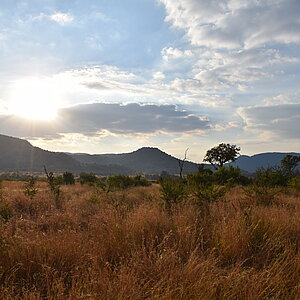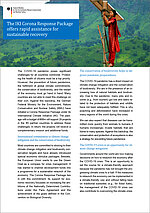Biodiversity Finance Initiative (BIOFIN II)
The financing of biodiversity conservation is a key issue in the implementation of the Convention on Biological Diversity (CBD). Most countries lack reliable information on the actual costs that are needed to effectively implement their biodiversity strategies, nor do they know where the necessary funds can be sourced and how they can be used to implement their strategies. The BIOFIN initiative, meanwhile active in over 40 countries, is a global partnership that supports its partner countries by addressing these knowledge gaps. Financing solutions are being developed and implemented in a second step. BIOFIN II (extended) focuses on 1.)The implementation of biodiversity finance plans, 2.) Protected area finance, 3.) Development of innovative finance Solutions and 4.) Knowledge sharing.
- Countries
- Argentina, Belize, Bhutan, Botswana, Brazil, Cambodia, China, Colombia, Costa Rica, Cuba, Ecuador, Georgia, Guatemala, India, Indonesia, Kazakhstan, Kyrgyzstan, Madagascar, Malawi, Mexico, Mongolia, Mozambique, Nepal, Peru, Philippines, Rwanda, South Africa, Sri Lanka, Tanzania, Egypt, Thailand, Gabon, Niger, Viet Nam, Uzbekistan, Zambia, Uganda, Fiji, Maldives, Namibia, Malaysia, Ukraine
- IKI funding
- 51,500,000.00 €
- Duration
- 01/2018 till 12/2030
- Status
- open
- Implementing organisation
- United Nations Development Programme (UNDP)
- Political Partner
-
- Diverse biodiversity relevant institutions in the respective partner countries/Diverse biodiversitätsrelevante Institutionen in den entsprechenden Partnerländern
State of implementation/results
Interim Results
- Under the new GEF Umbrella Programme, 91 new countries have signed up to design national biodiversity finance plans. BIOFIN is closely engaging with the CBD COP 16 process. The team is working with partners on more than 10 side events and is part of the organizing team of the Finance Day.
- BIOFIN launched a guidebook for subsidy repurposing and published the report on how Biodiversity Finance Plans can support National Biodiversity Strategies and Action Plans in 2024.
- UNDP conducted a study of five emerging economies (Indonesia, India, Mexico, Zambia, and Costa Rica) to assess their readiness for nature-related disclosures.
- "Investing in the Planet’s Safety Net" published in 2022, is a collection of Biodiversity Finance Stories from the Field authored by a partner working alongside UNDP-BIOFIN.
- In Mexico, BIOFIN participated in the construction of Mexico’s Sustainable Finance Taxonomy, issuing recommendations for the agricultural and forestry sector.
- In India, with BIOFIN support, saw a marked increase of 7X (from USD 149,724 in 2023 to USD 1,197,809 in 2024) in the budget allocated by the Government of Telangana to the Telangana State Biodiversity Board.
- The government of Botswana introduced updated protected area fees in April 2022. The new fee system saw an increase of US$ 7 million on collected fees, significantly higher than projections.
- In Costa Rica, the second edition of the Indigenous Tourism RAICES incubator Program concluded in April 2024, mobilizing and catalysing US$ 1,5 Mio. USD
- In Sri Lanka 100 SMEs were certified with the National Sustainable Tourism Certification scheme during a ceremony held in May 2024. Certification holders have experienced a 15-20% increase in their income in the post-certification period.
- BIOFIN Mongolia worked to improve enforcement of a national law on natural resource user fees through a new regulation, coupled with the introduction of a transparent online database for environmental funds allocation, municipalities have already begun to report their new budget allocations, showing a remarkable US$ 3 million increase compared to previous years for the 2023 budget.
Latest Update:
04/2025
Further links
- Publication: Investing in the Planet’s Safety Net: Biodiversity Finance Stories from the Field
- Video: Explanation video on the BIOFIN approach.
- E-learning module on biodiversity finance
- Study: National readiness for nature-related disclosures in emerging markets
- Newsletter – Biodiversity Finance Brief – July 2024
- Guide: The nature of subsidies: A step-by-step guide to repurposing subsidies harmful to biodiversity
- Guidebook: How can Biodiversity Finance Plans support NBSAPs?
- Briefing paper: Engaging Private Finance in the NBSAP Review and Implementation: Signposts for Policymakers
- Study: National readiness for nature-related disclosures in emerging markets
Project relations
Legend:
The link has been copied to the clipboard












